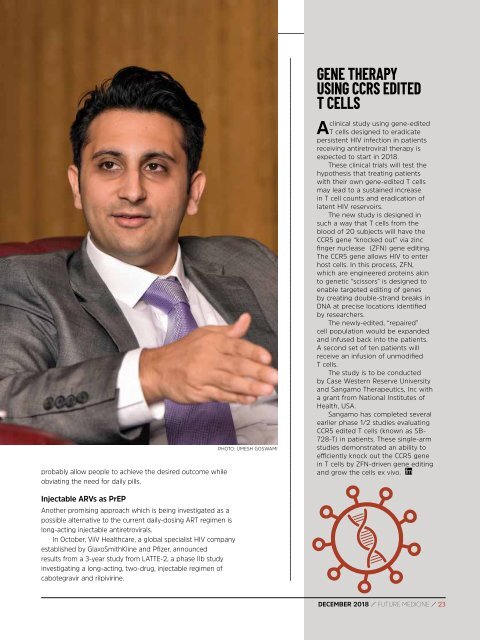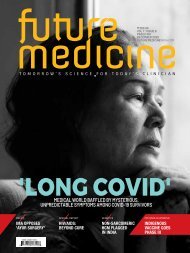FM DECEMBER 2018 ISSUE - digital edition
Create successful ePaper yourself
Turn your PDF publications into a flip-book with our unique Google optimized e-Paper software.
probably allow people to achieve the desired outcome while<br />
obviating the need for daily pills.<br />
PHOTO: UMESH GOSWAMI<br />
GENE THERAPY<br />
USING CCRS EDITED<br />
T CELLS<br />
clinical study using gene-edited<br />
A T cells designed to eradicate<br />
persistent HIV infection in patients<br />
receiving antiretroviral therapy is<br />
expected to start in <strong>2018</strong>.<br />
These clinical trials will test the<br />
hypothesis that treating patients<br />
with their own gene-edited T cells<br />
may lead to a sustained increase<br />
in T cell counts and eradication of<br />
latent HIV reservoirs.<br />
The new study is designed in<br />
such a way that T cells from the<br />
blood of 20 subjects will have the<br />
CCR5 gene “knocked out” via zinc<br />
finger nuclease (ZFN) gene editing.<br />
The CCR5 gene allows HIV to enter<br />
host cells. In this process, ZFN,<br />
which are engineered proteins akin<br />
to genetic “scissors” is designed to<br />
enable targeted editing of genes<br />
by creating double-strand breaks in<br />
DNA at precise locations identified<br />
by researchers.<br />
The newly-edited, “repaired”<br />
cell population would be expanded<br />
and infused back into the patients.<br />
A second set of ten patients will<br />
receive an infusion of unmodified<br />
T cells.<br />
The study is to be conducted<br />
by Case Western Reserve University<br />
and Sangamo Therapeutics, Inc with<br />
a grant from National Institutes of<br />
Health, USA.<br />
Sangamo has completed several<br />
earlier phase 1/2 studies evaluating<br />
CCR5 edited T cells (known as SB-<br />
728-T) in patients. These single-arm<br />
studies demonstrated an ability to<br />
efficiently knock out the CCR5 gene<br />
in T cells by ZFN-driven gene editing<br />
and grow the cells ex vivo.<br />
Injectable ARVs as PrEP<br />
Another promising approach which is being investigated as a<br />
possible alternative to the current daily-dosing ART regimen is<br />
long-acting injectable antiretrovirals.<br />
In October, ViiV Healthcare, a global specialist HIV company<br />
established by GlaxoSmithKline and Pfizer, announced<br />
results from a 3-year study from LATTE-2, a phase IIb study<br />
investigating a long-acting, two-drug, injectable regimen of<br />
cabotegravir and rilpivirine.<br />
<strong>DECEMBER</strong> <strong>2018</strong> / FUTURE MEDICINE / 23


















